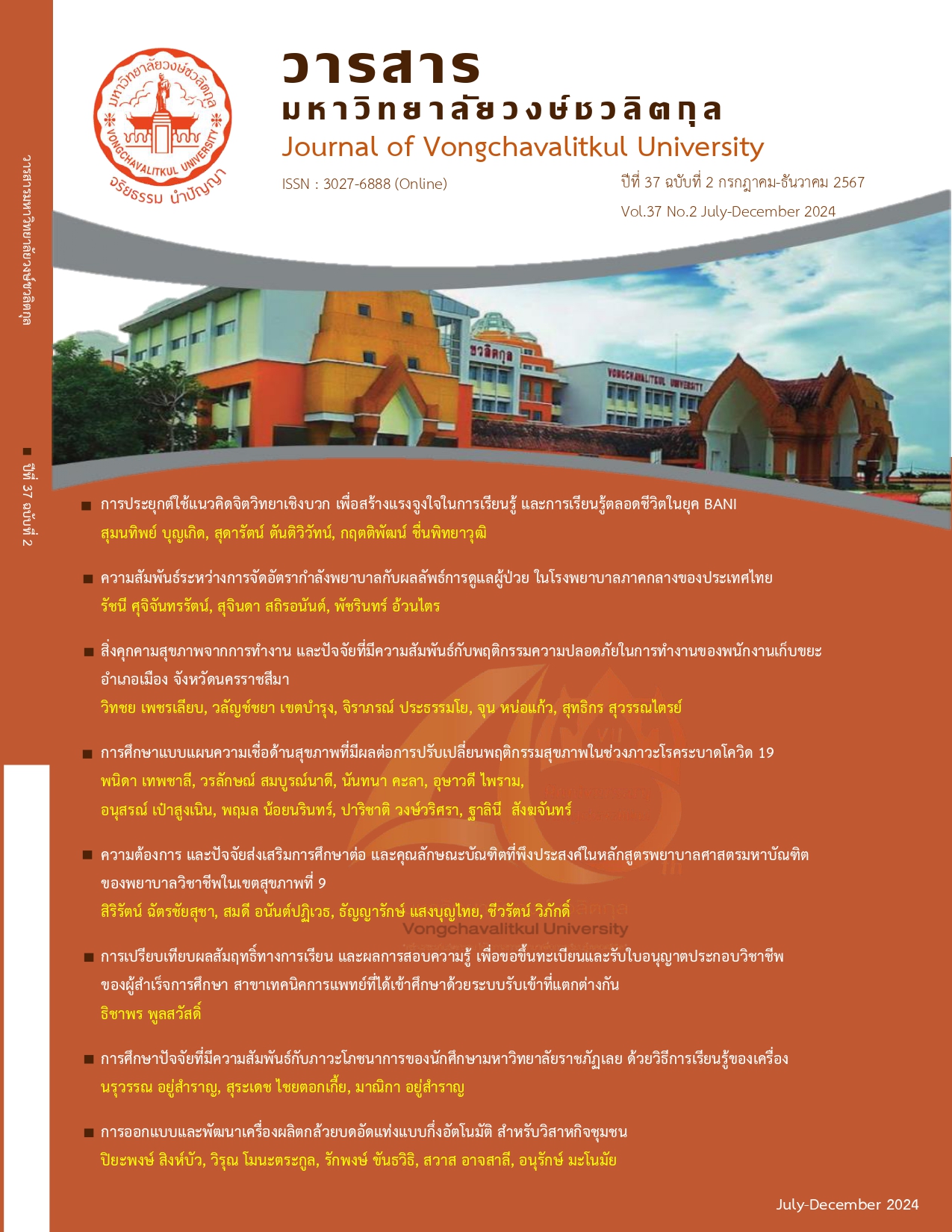Design and Development of the Semi-Automatic Banana Stick Production Machine for Community Enterprises
Main Article Content
Abstract
Objectives: This research aimed to study and design a semi-automatic banana stick production machine suitable for community enterprises. The primary objectives were to enhance production efficiency, reduce labor costs, and promote income generation within the community.
Method: The development of the semi-automatic banana stick production machine began with designing its operating system, which comprised three main processes: banana mashing, mixing, and bar forming. In the first process, the banana mashing unit was designed to handle up to 25 kilograms of bananas per cycle, ensuring an adequate capacity for community-level production. The second process involved a mixing unit to add ingredients based on a specified ratio and ensure thorough blending before transferring the mixture to the bar-forming unit. The bar-forming unit utilized a screw extrusion mechanism, enabling continuous production of banana bars. It was equipped with a cutting blade mechanism that allowed the bars’ length to be adjusted between 10 and 15 centimeters. Additionally, a conveyor system was implemented to transfer the cut banana bars to a receiving tray, where they were arranged for subsequent drying.
Results: The semi-automatic banana stick production machine demonstrated a production capacity of at least 12.5 kilograms per hour, or approximately 100 kilograms per day, with only two workers required. The operation was divided into four cycles per day (two hours per cycle), each processing 25 kilograms of pre-mixed banana mash. The amount of banana mash that could not be extruded into bars was minimal at only 0.11 kilograms, resulting in a machine efficiency of 98.26%. Moreover, the machine was estimated to generate additional income of approximately 200,000 THB per year. With a machine cost of 320,000 THB, the payback period was approximately 1.6 years.
Article Details

This work is licensed under a Creative Commons Attribution-NonCommercial-NoDerivatives 4.0 International License.
References
Ahmed, Z., El-Sharnouby, G. A., & El-Waseif, M. A. (2021). Use of Banana peel as a by-product to increase the nutritive value of the cake. Journal of Food and Dairy Sciences, 12(4), 87–97.
Atlascompany. (2023). PNG Banana flour isolated on white background. https://www.freepik.com/free-photo/png-banana-flour-isolated-white-background_275623177. htm#fromView=keyword&page=1&position=32&uuid=edfe88c4-22ce-4f54-bb47-5bbede436a60
Atli, A. (2023). Bananas 101: Nutrition Facts and Health Benefits. Healthline, https://www. healthline.com/nutrition/foods/ bananas
Bezerra, C. V., Rodrigues, A. M. da C., Amante, E. R., & Silva, L. H. M. da. (2013). Nutritional potential of green banana flour obtained by drying in spouted bed. Revista Brasileira de Fruticultura, 35, 1140–1146.
Biernacka, B., Dziki, D., Różyło, R., & Gawlik-Dziki, U. (2020). Banana powder as an additive to common wheat pasta. Foods, 9(1), 53.
González-Soto, R. A., Mora-Escobedo, R., Hernández-Sánchez, H., Sánchez-Rivera, M., & Bello-Pérez, L. A. (2007). Extrusion of banana starch: characterization of the extrudates. Journal of the Science of Food and Agriculture, 87(2), 348–356.
https://doi.org/https://doi.org/10.1002/jsfa.2738
Guo, J., Duan, J., Li, J., & Yang, Z. (2020). Mechanized technology research and equipment application of banana post-Harvesting: A review. Agronomy, 10(3). https://doi.org/ 10.3390/agronomy10030374
Maia, B. G. D. O., Souza, O., Marangoni, C., Hotza, D., Oliveira, A. P. N. D., & Sellin, N. (2014). Production and characterization of fuel briquettes from banana leaves waste. Chemical Engineering Transactions, 37, 439-444. https://doi.org/ 10.3303/CET1437074
Naknaen, P., Charoenthaikij, P., & Kerdsup, P. (2016). Physicochemical properties and nutritional compositions of foamed banana powders (Pisang Awak, Musa sapientum L.) dehydrated by various drying methods. Walailak Journal of Science and Technology (WJST), 13(3), 177–191.
Razali, S. A., Nor, M. Z. M., Anuar, M. S., Shamsudin, R., & Mohamad, W. A. F. W. (2020). Banana powder production via foam mat drying. Advances in Agricultural and Food Research Journal, 1(2), a0000142. https://doi.org/10.36877/aafrj.a0000142
Samsudin, N. I. P., Roslan, N. A., Nor-Khaizura, M. A. R., & Hasan, H. (2019). Shelf life extension of ambient-stored banana cake using banana powder. International Food Research Journal, 26(1), 305-312
Van Tai, N., Van Hao, H., Han, T. T. N., Giau, T. N., Thuy, N. M., & Van Thanh, N. (2024). Effect of foaming conditions and drying temperatures on total polyphenol content and drying rate of foam-mat dried banana powder: Modeling and optimization study. Journal of Agriculture and Food Research, 18, 101352. https://doi.org/https:// doi.org/10.1016/j.jafr.2024.101352
Yap, M., Fernando, W. M. A. D. B., Brennan, C. S., Jayasena, V., & Coorey, R. (2017). The effects of banana ripeness on quality indices for puree production. LWT, 80, 10–18. https://doi.org/https:// doi.org/ 10.1016/j.lwt.2017.01.073


